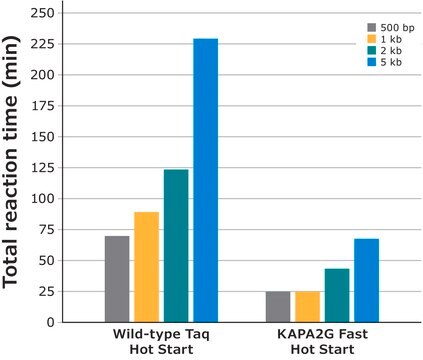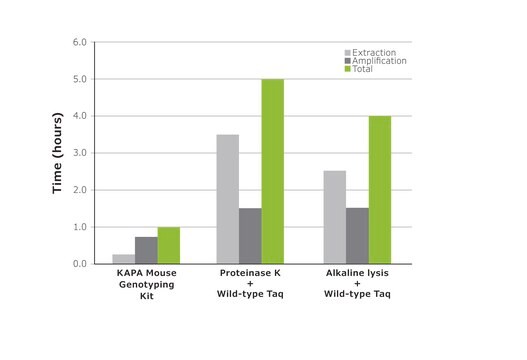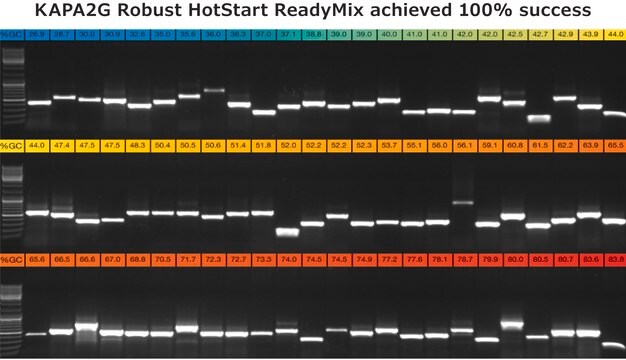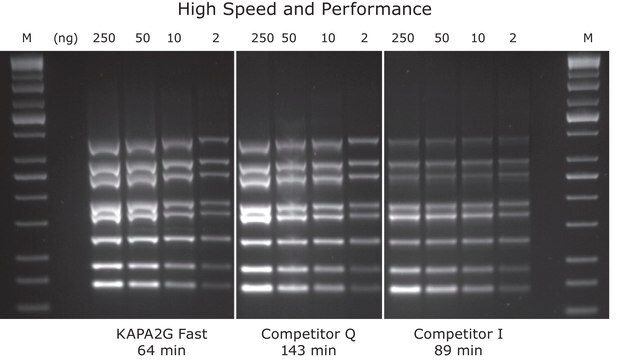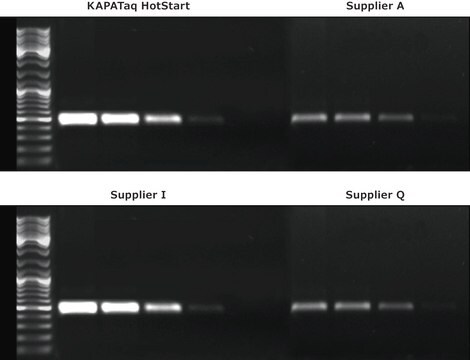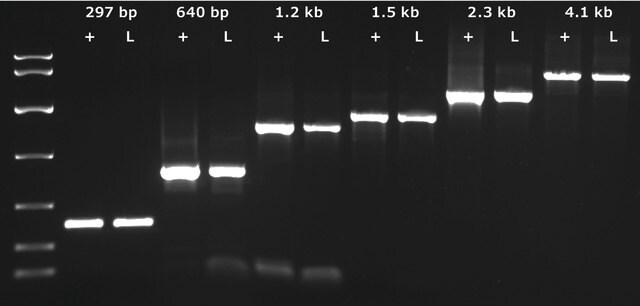2GFHSRMKB
Roche
KAPA2G Fast HotStart ReadyMix
2 ×
Synonyme(s) :
PCR, hotstart PCR
About This Item
Produits recommandés
Utilisation
sufficient for 100 reactions
sufficient for 500 reactions
Niveau de qualité
Durée de conservation
≤18 mo.
Caractéristiques
Fast PCR
Multiplex PCR
dNTPs included
hotstart
Conditionnement
kit of 1.25 mL (100 x 25 μL rxn; KK5603)
kit of 6.25 mL (500 x 25 μL rxn; KK5601)
Fabricant/nom de marque
Roche
Concentration
2 ×
Technique(s)
PCR: suitable
Entrée
purified DNA
Température de stockage
−20°C
Vous recherchez des produits similaires ? Visite Guide de comparaison des produits
Description générale
KAPA2G Fast DNA Polymerase Kits are designed for fast PCR, in which total reaction times are 20–70% shorter than those of conventional PCR assays performed with wild-type Taq DNA polymerase. This can be achieved without sacrificing reaction performance, and does not require specialized PCR consumables or thermocyclers.
KAPA2G Fast HotStart® DNA Polymerase is supplied in a convenient 2X ReadyMix format, containing all reaction components except primers and template.
Application
- Routine PCR
- Fast PCR
- Reverse transcription polymerase chain reaction (RT-PCR)
- Genotyping and fluorescent PCR
Actions biochimiques/physiologiques
Caractéristiques et avantages
- Extension times as low as 1 sec per kilobase
- Broad coverage of both AT- and GC-rich targets
High speed, higher performance :
- Single copy sensitivity from complex targets
- Increased yields
Quick Notes :
- KAPA2G Fast HotStart ReadyMix PCR Kits contain the engineered KAPA2G Fast HotStart DNA Polymerase, developed for fast PCR.
- Use 1 sec extension time for amplicons <1 kb and 15 sec/kb for longer amplicons, and save 20–70% of total reaction time.
- No need for specialized instrumentation or PCR consumables.
- Optimized buffer system offers improved yields, specificity and sensitivity, facilitating efficient primer annealing across a wide range of primer lengths, GC contents, and melting temperatures.
- For high reaction efficiency, do not exceed 25 μL reaction volumes.
- KAPA2G Fast HotStart ReadyMix contains 1.5 mM MgCl2 at 1X.
- KAPA2G Fast HotStart ReadyMix with dye includes two inert tracking dyes to allow direct loading onto agarose gels.Reaction products are 3′-dA-tailed and may be cloned into TA cloning vectors.
Qualité
Notes préparatoires
Autres remarques
Informations légales
Composants de kit seuls
- KAPA2G Fast HotStart® DNA Polymerase 0.5 U per 25 µL reaction
- MgCl2 1.5mM at 1X
- dNTP Mix 0.2 mM of each dNTP at 1X
Mention d'avertissement
Warning
Mentions de danger
Conseils de prudence
Classification des risques
STOT SE 2
Code de la classe de stockage
12 - Non Combustible Liquids
Classe de danger pour l'eau (WGK)
WGK 1
Point d'éclair (°F)
does not flash
Point d'éclair (°C)
does not flash
Certificats d'analyse (COA)
Recherchez un Certificats d'analyse (COA) en saisissant le numéro de lot du produit. Les numéros de lot figurent sur l'étiquette du produit après les mots "Lot" ou "Batch".
Déjà en possession de ce produit ?
Retrouvez la documentation relative aux produits que vous avez récemment achetés dans la Bibliothèque de documents.
Les clients ont également consulté
Articles
An overview of directed evolution and the methods for generating proteins with optimized or entirely new functions.
Notre équipe de scientifiques dispose d'une expérience dans tous les secteurs de la recherche, notamment en sciences de la vie, science des matériaux, synthèse chimique, chromatographie, analyse et dans de nombreux autres domaines..
Contacter notre Service technique